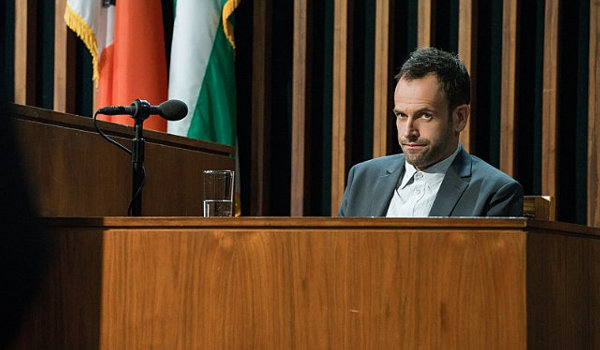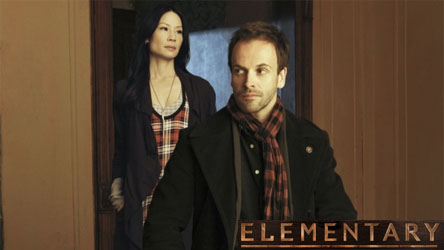- Title: Elementary – Tremors
- wiki: link


When Sherlock Holmes (Jonny Lee Miller) makes a mistake the consequences could be dire for both Holmes and Watson (Lucy Liu) as well as Detective Bell (Jon Michael Hill). “Tremors” begins, after the detectives help the NYPD close a brutal murder a confused schizophrenic (Zachary Booth) had been framed for by the victim’s doctor (Jordan Lage), in a courtroom to examine the events that led to Bell’s shooting and the methods employed by Holmes to determine if the detective will be allowed to stay on as a consultant with the NYPD.
“Tremors” is an interesting episode. Holmes’ mistake wasn’t one that led the police down the wrong path of an investigation nor a flight of fancy, but instead goes directly to the man’s confrontational and legally-gray methods that knocked down a first domino, the last of which would end with Bell stepping in front of a bullet for the detective. The small group of friends Holmes has acquired over his stint in New York appears to lose a key member when the (perhaps permanently) disabled Bell is unable to accept Holmes’ apology or offer of assistance in his recovery.
The courtroom setting also allows for the guest-appearance of Elizabeth Marvel as a prosecutor trying to get the detectives kicked-off the police payroll (even though they technically work for free). The back-and-forth between Miller and Marvel provides several of the episode’s best moments as Holmes recounts the events through flashbacks. Despite the fact that there’s no evidence at all Holmes methods are solely responsible for the rash actions of a parole violator (Danny Mastrogiorgio), the judge (Frankie Faison) rules against Holmes and recommends the NYPD sever all connections with the detective and his partner.
As the series isn’t set to end, the episode ends with a twist with the commissioner deciding to ignore the judge rulings (perhaps on the advice of Detective Bell). Dramatically Bell’s shooting leads to all kinds of new opportunities, as well as lingering guilt for Holmes which might manifest in a variety of ways in the coming weeks. However, I am saddened with the storyline as it means we’re likely to see far less of Jon Michael Hill in the coming episodes and the events create a further rift between Holmes and the department.


“Elementary” is fiction based loosely, very loosely, on police crime detection. I get that. I watch all the crime drama shows and “Elementary” is by far the most interesting, tied for first place with “Mentalist”.
The episode “Tremors” challenges the credulity of the most ardent supporter of the police state. Is this story line meant to be a parody of police procedure? In the first scene we see the police barely able to keep from shooting a bloody young man because he might touch a gun. This is believable in the U.S. where a 13 year old boy can be shot 7 times in the back for walking on the street with a toy gun. But later are we supposed to believe a man can shoot an LEO in cold blood, in front of his cronies, and be told to “put the gun down”, i.e., please don’t continue shooting policemen, we might have to hurt you? For a moment I thought I was watching the absurd, “Naked Gun”.
Now put the scenes in context of the episode. Sherlock is on trial for being rude to a sleazy murder suspect at his workplace, possibly violating his privacy rights. This in a country that lets its federal police (NSA) get by with secretly spying on everyone, lie about it to Congress, and then declare a whistleblower to be the criminal. We were shocked at Nixon for admitting he broke the law and he resigned. Now it seems the POTUS and his minions are above the law.
Furthermore, Homes may not be allowed to donate his services because he did not predict what no one else saw coming. He is somehow responsible for not knowing the ex-con would lose his job and go berserk. But no blame is ascribed to the parole officer who knew the assailant better, the police who worked the case, or Watson.
Next, Det. Bell decides to be a human shield to stop a bullet. And then blames Sherlock. Bell could have kept a better watch on the angry, shouting man. But he did not. He could have drawn his piece sooner and fired. But he did not. He could have stayed out of the path of the bullet and it might have missed Sherlock. But he did not. What was his responsibility? He was held blameless. Why?
I interpret these improbable scenarios twofold. First, as a poorly written attack on the virtue of reason and the pride that comes from consistent application of it. Second, as an homage to the hard working, rule following without question public servants who sacrifice for us. Fiction at its worst.
Fair points, all. However if you put any show up to the scrutiny of close comparison against real life you’ll start to lose the enjoyment of the drama itself. There is a certain suspension of disbelief we need to maintain in order to enjoy these shows. This is one of my favorites, but I completely understand your points.
Would someone be able to show a gun inside a NY City police squad and walk away? Doubtful. Would someone be able to shoot an officer and not immediately be shot himself? Absolutely not. But the point isn’t to show these situations realistically, but to use them for dramatic effect. They can’t shoot the kid at the beginning because he’s needed for the plot, and they probably didn’t shoot the guy at the end so there isn’t any closure to Bell’s situation.
The ultimate ‘message’ of the episode was above and beyond these set pieces which served merely to move the plot along. Not meant to be realistic so much as idealistic and convenient.
You seem to be a fan overall, so perhaps it was just certain specific pieces of this episode that caused your disbelief to bleed through. As a programmer, it’s the same for me when they show unrealistic computer usage. But I try to let it slide for the big picture.
I let a lot slide for TV screenplays. The brevity of 46 minutes is conducive to many short cuts when constructing a plot/storyline. I took that into account with “Tremors”. But that was not the point of my review. I gave specific examples of a general theme. The theme was twofold: 1. Holmes is an anti-social non-conformist whose disrespect for the law puts those around him in danger. This elicited the well deserved anger of his co-workers. 2. The police follow the law, respect the privacy of citizens, and expect the Holmes/Watson team to do the same, even if it means being less effective in fighting crime. When they “bend” the law it upsets the other detectives so much that they feel compelled to file an official complaint with the objective of eliminating the consultants. Jealousy plays no part. Fear of having their incompetent performance exposed plays no part. And the validity of the LEO’s concerns are proven by the judgement of an objective expert, the judge. Surly, if he sides with the LEOs, their complaint is justified. His recommendation for termination trumps Captain Gregson’s opinion.
I should have condemned the writing as “a bad morality lesson”. That would have been more accurate. I meant to point out the irrationality of the “ultimate message of the episode” which “these set pieces” were written to expose, not just their unreal depiction. Also, I would point out a better writer could have found more “convenient” ways to expound the “idealistic” theme that conformity trumps competence. But does that mean I should “suspend my disbelief” of the theme? No. Theme is wrong, however portrayed. And that is what matters.
Don, I wouldn’t agree with you that “jealousy plays no part” as we have already seen in a previous episode a detective very much jealous of the preferential treatment Holmes and Watson receive (even going so far as to warn Gregson about it). I think another part of the mix is “insiders” versus “outsiders.” Despite his victories, the cops at the precinct are not going to see Holmes as one of them (especially given how much contempt he shows anyone that is not Watson, Bell, or Gregson). He’s an outsider who, in their opinion, hasn’t earned his elevated position in the department.
Exactly. Of course jealousy of a more competent detective fuels the complaints. I was giving my take on what the theme of “Tremors” portrayed. I did not think that this new theme was consistent with the past episodes or that it was fair or rational. Was this the work of a new writer? It was both sub standard writing and a repugnant theme.
I mistook your critique of the procedural elements being unrealistic as an inability to suspend disbelief (which is ironic considering the main character is a savant-like super sleuth with eidetic memory).
However, if you are condemning the message, as you clarified above, then I would definitely agree. But that condemnation would apply to the entire series. Holmes is an anti-hero – he breaks the law to uphold the law. The overall message of his methods are that the end justifies the means, and by that definition is immoral. This episode explored that, somewhat clumsily.